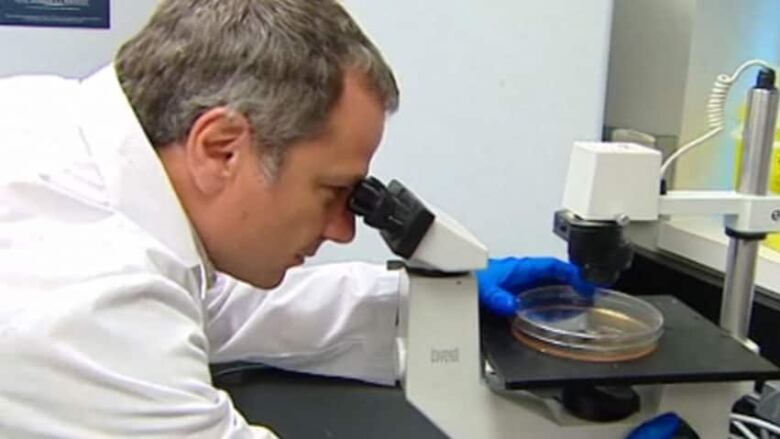Winnipeg lab researcher expects Zika vaccine this year
National Microbiology Laboratory at the centre of developing a new vaccine for Zika virus

To date, fourCanadians have returned from travels testing positive for theZika virus and the pressure is on to develop a vaccine in case the mosquito-bornevirus develops into a global emergency, saysDr. GaryKobinger, chief of special pathogens withthe National Microbiology Laboratory in Winnipeg.
- Zika virus confirmed among 4 Canadian travellers
- Zika virus risk low but spooks Manitoba travellers
- Zika virus: 6 things to know about the growing outbreak
It's still not clear how much of a riskZikavirus poses to humans, according to public health experts. The virus has been around for decades and until recently wasn't considered serious. Only aminority of those infected experienced symptoms and most are mild, a skin rash and fever. People generally recover fromZikaviruswithin a week.

Asresearchers focus efforts on investigating a link between birth defects and Zika, the World Health Organization predicts the number of people infected with the viruscould rise rapidly this year and may reach four million by 2017.
Dr. Kobinger, who willbecome the director of the Centre for Research in Infectious Diseases at Laval University in Quebec City in June,is hoping to develop a safe and effective vaccine before that happens.
He spoke with Up toSpeed's IsmailaAlfa.
Ismaila Alfa:Howconcerned should Canadians be about Zika virus?
Dr. Kobinger:It's really an infectious disease that's of low risk to Canadians. It's a virus that is transmitted by mosquitoes primarily and the type of mosquitoes that carrythe virus is not found in Canada.
Why do we know so little about this virus and this effect that it may or may not be having on babies?
It's a virus that's been circulating for over 60years. Mainly from Africa to Asia and then it crossed east and appeared in the Americas. It's not linked to a very severe disease right out. It's one of those viruses that people have been working on but in a more limited fashion, unfortunately.
Now you are working on the vaccine for the virus. How long has the National Microbiology lab been working on the vaccine?
Only quite recently. We have been collaborating with a fantastic team in the U.S. at the University of Pennsylvania lab led by David Weiner. He's done vaccine development for dengue virus and West Nileand these are very closely related. A few months ago we got in touch and he told me about Zika. Since then we've been focusing on this. We've developed this group and we work so well together that we move fast.
How far along are you in developing this vaccine?
I'm amazed. This vaccine is already in clinical production. We hope that all the testing, as in the past, will be acceptable to regulators like Health Canada and the FDA and we'll be able to start enrolling volunteers, with their approval, and start a stageone clinical trial by mid or late-summer. That's a goal of course, we don't know if we can achieve it, but I think we can.
When could this vaccine be usable in humans?
Maybe by the fall. At least in 2016. It doesn't mean the vaccine is all of a sudden available for the entire population. The goal is to do our best but to be ready if there's an emergency. When we faced the (Ebola) outbreak in West Africa, we had a clinical lab but we didn't have human data for safety data. Now we want those safety data before we face a real emergency.
This interview was edited for length and clarity.












_(720p).jpg)


 OFFICIAL HD MUSIC VIDEO.jpg)
.jpg)



























































































